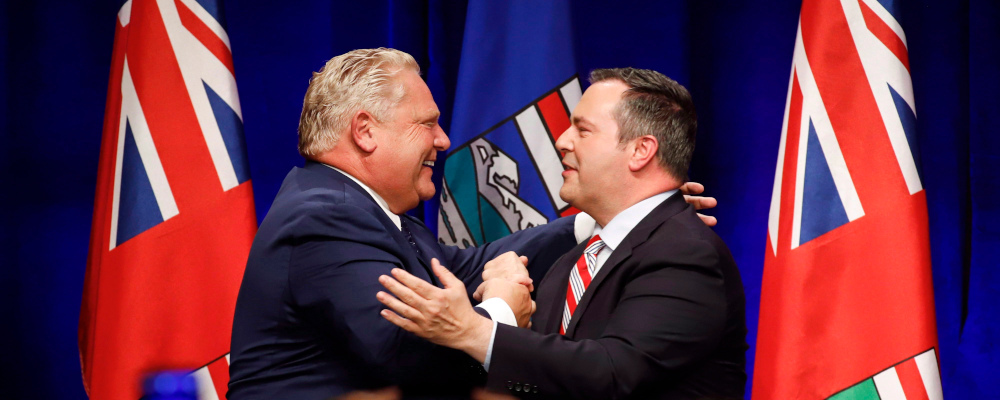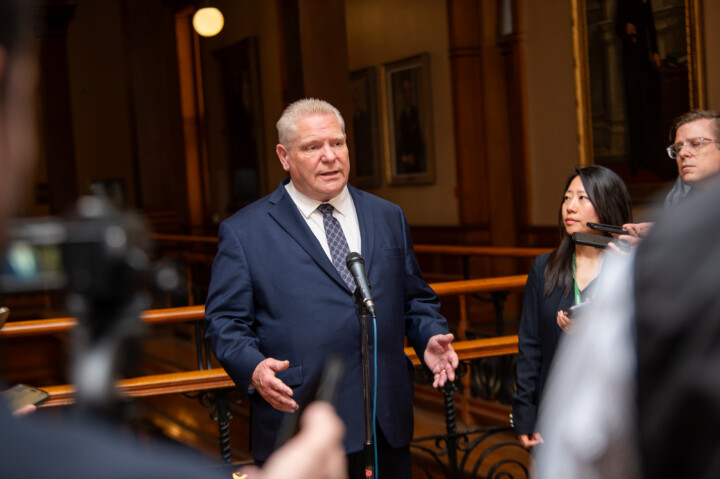The political trajectories of Jason Kenney and Doug Ford offer a contrast, but it isn’t the one most people think it is. Their fortunes say more about two provinces than they do about two premiers. Doing my part for national unity, I’d like to elaborate with a passel of lazy stereotypes and recklessly sweeping generalizations. Be warned: what follows is tongue-in-cheek honesty; truth with a wink. If you’re offended, please direct your ire to my Twitter feed, which I never read.
Ford’s campaign team deserves a lot of credit for their somnolent re-election strategy that smartly avoided anything that might smack of inspiration. When you are facing opponents who think and talk in shades of beige, an upbeat campaign that promises with vacuous vehemence to “say yes” and “get it done” is just good politics. So well done to them, really. That the campaign was suicidally depressing for anyone who cares about policy or vision is beside the point, because “anyone” apparently doesn’t include Ontarians who vote.
The most common question for anyone watching the election from outside Ontario was, “What the heck is the 413, and why do people care so much about it?” The idea of an Alberta election turning on the future of the Calgary ring road, for instance, is beyond funny—it’s unthinkable. But the listless campaign seemed right for a province that has lost its mojo. The sort of place where the government can fence off cherry blossom trees during Covid and the people don’t just laugh and tear them down. A place where the pedal pubs aren’t allowed to serve beer,Want to actually drink on a pedal pub? That may prove surprisingly tricky https://www.tvo.org/article/want-to-actually-drink-on-a-pedal-pub-that-may-prove-surprisingly-tricky which may or may not be related to the fact that there is still a Prohibition-era outfit called “The Beer Store.”
Ontario used to bill itself as “a place to stand, a place to grow,” but it feels like it’s been all downhill since the province’s last burst of creative energy in 1976, when it built a really tall tower. Today the province appears to think of growth in terms of ever-expanding sprawl across farmland to keep a mortgage-based economy afloat. It’s certainly no place to grow a family, not in a million-dollar tear-down in the outer suburbs with a 60-minute commute to a grey forest of steel and glass office towers. Viewed from the West, it is not surprising that almost half of the people who left Canada in the first quarter of the year left Ontario.Canadians Permanently Leaving Was Unusually High For The First Quarter https://betterdwelling.com/canadians-permanently-leaving-was-unusually-high-for-the-first-quarter/
Alberta could not be more different. It is Canada’s youngest province, demographically speaking, and its best-educated—and its politics reflect that. The electorate bristles with the uncompromising vigour of youth and the entrepreneurial impatience of the newcomers who are drawn to it. That is a good thing, mostly. Albertans have little patience for provincial leaders who don’t meet their high, sometimes unreasonably high, expectations. It’s not just Kenney—six of the last seven premiers left office before completing a full four-year term. The fractiousness of Alberta’s politics is part of the province’s dynamism.
As Schumpeter might have predicted, there is also economic creation to go with the political destruction. A lot of it. Alberta isn’t just younger than Ontario, it feels newer and fresher. It feels, dare I say, hopeful. I’ve never understood the science behind the wide prairie sky—surely the sky is the same size everywhere—but d*mn it if the sky doesn’t look bigger when you step off the plane in Calgary or Edmonton. There is also sun and space. The most sun in CanadaThe Sunniest Cities In Canada https://www.worldatlas.com/articles/the-sunniest-cities-in-canada.html and space as far as you can see around every city. And where there is space, there is room to imagine, room to dream big and demand more. Room, pace Ontario, to grow. The economy is also booming, thanks to global commodity prices but also thanks to the economic policies Kenney introduced before Covid. And it is, once again, the most attractive province for other Canadians, who are voting with their feet.Canadians Fleeing Ontario Is Accelerating, Alberta Becomes Top Destination https://betterdwelling.com/canadians-fleeing-ontario-is-accelerating-alberta-becomes-top-destination/
Alberta overspills with confidence, which is often misinterpreted by self-deprecating (read: self-doubting) central Canadians as arrogance or entitlement. On a recent podcast (it was one of these, I don’t recall which), journalist Matt Gurney suggested that Alberta’s identity is “anti-Laurentian.” This is funny, because Gurney lives in Toronto, a city that has no identity. Toronto prides itself on being a cultural mosaic, you see, which is a worthy ideal—except the point of a mosaic is that when you step back all the individual tesserae meld into a harmonious picture. It has been so long since anyone thought about a united and unifying culture in Ontario that when you step back and look at the bigger picture, the impression is of slapdash patchwork. Sorry, a world-class slapdash patchwork.
Alberta, by contrast, is a place where newcomers are greeted by an impromptu junior rodeo. Refugees and immigrants are met by Stampede Royalty, a man in a goofy horse costume, and a white-hatting ceremony. Go ahead and snigger at these cheesy faux-Western pretensions in suburban Calgary, but I defy you to watch this and not be charmed. And I’ll bet anything those families feel a little bit more a part of their new province than they did the day before. It is an effective way of showing new Albertans that they are part of something bigger, something fun, something exciting, something unique. A confident identity.
As for the anti-Laurentian sentiment, what central Canadians don’t seem to get is that the West (by which I mean the prairie provinces—British Columbians never even think about central Canada) doesn’t dislike them. It just doesn’t have time for them. Living in Alberta and looking east feels like being stuck on an escalator behind someone who won’t walk or get out of the way, a slow-poke who thinks he is the only person on the escalator. Albertans chafe at an earnestly plodding national politics that constrains their vaulting ambition.
Albertans’ resentment over equalization, for example, isn’t selfish. For decades, Albertans have shared their wealth with the rest of the country—more than $600 billion since 1967. It comes from a genuine bafflement that other provinces don’t seem to share their ambition. Albertans don’t begrudge helping smaller provinces, they just don’t understand why large provinces who choose not to develop their abundant resources should share in Alberta’s development of its own. Equalization is especially hard to take when the reaction to the annual handout is a lecture on the source of the charity. Note, this is not just about Quebec—an annual recipient of $13 billion in equalization; Ontario was a have-not recipient of Alberta’s largesse for a decade before 2019.
This brings us back to provincial politics. Where there is energy in a province, there is interest in its politics. Compared to Ontario, Alberta’s politics look like fireworks on acid. On the Left, the Alberta NDP under Rachel Notley is the most radical mainstream party in the country—far more so than the BC NDP under John Horgan or a traditional prairie NDP party. On the other side, the UCP has aggressively pursued conservative policies. It has expanded education options in the only province that already has real school choice, cut corporate taxes and red tape, pushed private health care innovation, and switched its drug addiction policy from addiction maintenance and a culture of death to funding recovery options and a culture of dignity and hope.
Unlike the catatonic complacency of the Ontario election, the next Alberta election will be a high-stakes political showdown. The Alberta NDP and the UCP offer voters a clear choice between parties with starkly different visions for the province’s future. It won’t be nice, it won’t be quiet, but it definitely won’t be boring. And that is a good thing. Because life, and a province, should be about more than empty slogans and a regional freeway.
Recommended for You
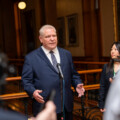
Ontario’s Progressive Conservatives need a wake-up call
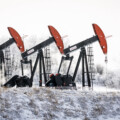
Decoding the uncertainty in Canada’s oil patch—and what it means for Carney’s investment ambitions
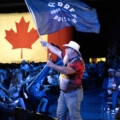
From Jordan Peterson law to bail reform: 9 policy proposals from the Conservative convention that could spur Canada’s comeback
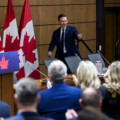
‘A delicate balance’: Why the Conservative convention is a crossroads for the party

